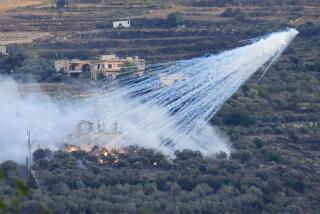Chlorine used in Syrian town of Saraqeb, chemical weapons watchdog says
- Share via
Reporting from THE HAGUE, Netherlands — The international chemical weapons watchdog said Wednesday that chlorine was likely used as a weapon in the rebel-held northern Syrian town of Saraqeb in early February, the latest report of poison gas being unleashed in Syria’s civil war.
The Organization for the Prohibition of Chemical Weapons released details of a report into the chlorine use, but did not say which side in the fighting used it. The OPCW is not mandated to apportion blame for the attack.
The probe into the use of chlorine gas in the Saraqeb attack comes amid the OPCW’s investigation into another attack two months later in Douma, near the capital Damascus — a much larger attack in April that triggered U.S., British and French strikes against government posts in Syria a week later.
The OPCW said that its Fact-Finding Mission probing alleged use of chemical weapons in Syria “determined that chlorine was released from cylinders by mechanical impact in the Al Talil neighbourhood of Saraqeb.”
On Feb. 4, the White Helmets search-and-rescue group and a medical charity reported that several people suffered breathing difficulties after a suspected chlorine gas attack on Saraqeb, days after the Trump administration accused President Bashar Assad’s government of producing and using “new kinds of weapons” to deliver poisonous gases. Damascus denied the White House’s charges.
At the time, the White Helmets said three of its rescuers and six other people suffered breathing problems. The Syrian American Medical Society said its hospitals in Idlib treated 11 patients for suspected chlorine gas poisoning.
OPCW Director-General Ahmet Uzumcu harshly criticized the chemical attack.
“I strongly condemn the continued use of toxic chemicals as weapons by anyone, for any reason, and in any circumstances,” Uzumcu said in a statement. “Such acts contradict the unequivocal prohibition against chemical weapons enshrined in the Chemical Weapons Convention.”
More to Read
Sign up for Essential California
The most important California stories and recommendations in your inbox every morning.
You may occasionally receive promotional content from the Los Angeles Times.













